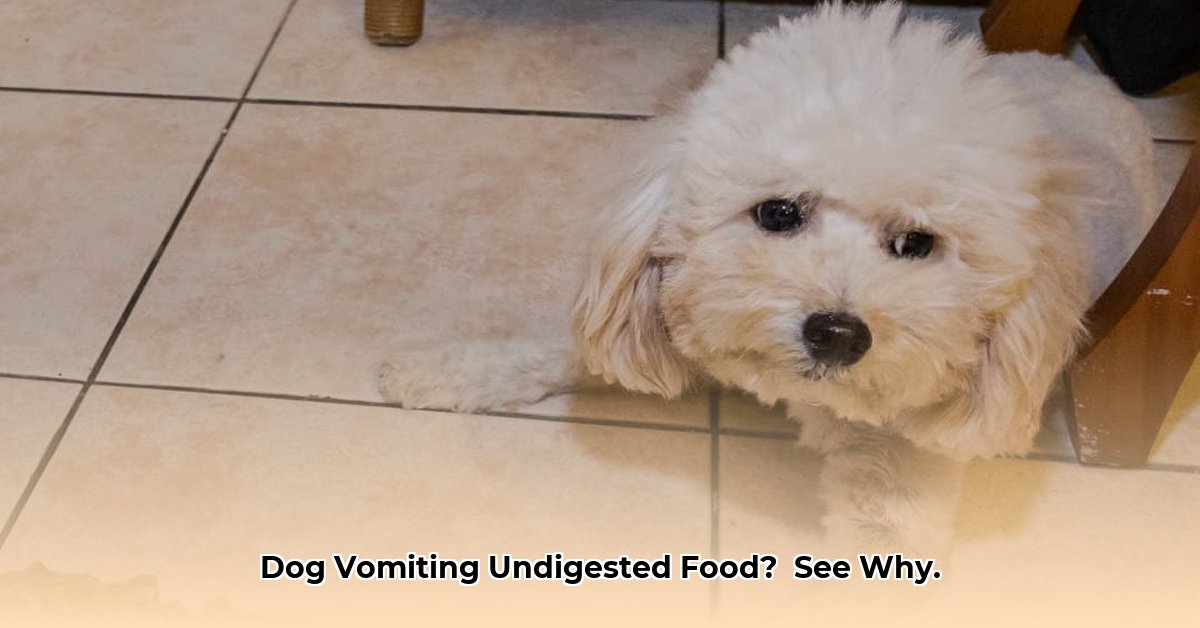Seeing your dog throw up undigested food can be alarming. This guide will help you understand what’s happening, determine if it’s an emergency, and provide practical steps to care for your furry friend.
Is It Vomiting or Regurgitation?
The first step is distinguishing between vomiting and regurgitation. This crucial difference helps pinpoint the location of the problem.
Spotting the Difference
Vomiting is an active, forceful expulsion of stomach contents. It often involves heaving, retching, and abdominal contractions. The vomit may contain digested food, bile (a yellowish-green fluid), and sometimes even undigested food. It typically happens a while after eating.
Regurgitation, on the other hand, is a passive process where undigested food comes back up from the esophagus (the tube connecting the mouth and stomach). It’s often effortless, occurring shortly after eating. The regurgitated food typically looks like a tube or cylinder of undigested kibble, and your dog might even re-eat it.
| Feature | Vomiting | Regurgitation |
|---|---|---|
| Appearance | Digested food, bile, may include undigested food | Undigested food, tubular shape |
| Timing | Often hours after eating | Usually soon after eating |
| Forcefulness | Forceful, with heaving and retching | Passive, effortless |
| Re-ingestion | Rarely happens | Sometimes |
This difference is important because vomiting suggests a problem in the stomach or intestines, while regurgitation points to an issue with the esophagus.
Why is My Dog Regurgitating or Vomiting?
Possible Causes of Regurgitation
Several factors can cause regurgitation:
- Foreign object: Something lodged in the esophagus (requires immediate veterinary attention).
- Megaesophagus: An enlarged and weakened esophagus that doesn’t effectively move food to the stomach.
- Persistent Right Aortic Arch (PRA): A birth defect where a blood vessel presses on the esophagus.
- Hiatal Hernia: Part of the stomach protrudes into the chest cavity. More common in brachycephalic breeds (dogs with short noses like Bulldogs and Pugs).
- Acid Reflux: Stomach acid backing up into the esophagus.
- Esophagitis: Inflammation of the esophagus.
- Esophageal Tumors: Though less common, these can obstruct the esophagus.
Possible Causes of Vomiting
The reasons for vomiting are even more diverse, ranging from mild to severe:
- Dietary Indiscretion: Eating something they shouldn’t have (garbage, toxins, etc.).
- Food Allergies/Sensitivities: Reactions to certain ingredients in their food.
- Infections: Viral, bacterial, or parasitic.
- Inflammatory Bowel Disease (IBD): Chronic inflammation of the digestive tract.
- Pancreatitis: Inflammation of the pancreas.
- Intestinal Blockage: An obstruction in the stomach or intestines (requires immediate veterinary attention).
- Metabolic Issues: Problems with organs like the kidneys or liver.
- Motion Sickness: Especially during car rides.
- Stress and Anxiety: Can manifest as physical symptoms.
- Medications: Side effects from certain drugs.
- Cancer: While less common, tumors can cause vomiting.
When to Call the Vet – A Guide for Concerned Owners
While occasional vomiting or regurgitation might not be cause for immediate alarm, some signs warrant prompt veterinary attention:
Emergency Situations (Seek Immediate Veterinary Care):
- Bloat (Gastric Dilatation-Volvulus or GDV): Symptoms include unproductive retching, a distended abdomen, restlessness , and excessive drooling. This is a life-threatening condition, particularly in deep-chested breeds.
- Suspected Foreign Object Ingestion: If you believe your dog swallowed something that could cause a blockage.
- Unproductive Retching/Heaving: Repeated attempts to vomit without producing anything.
- Collapse or Difficulty Breathing: These are signs of a serious medical emergency.
- Severe Lethargy or Weakness: A sudden and significant change in energy levels.
- Pale Gums: This suggests anemia, possibly due to internal bleeding.
Situations Requiring Prompt Veterinary Consultation (within 24 hours):
- Frequent Vomiting or Regurgitation: More than once in a few hours or repeatedly over several days.
- Blood in Vomit or Regurgitated Material: This could indicate a serious problem.
- Persistent Diarrhea: Especially if accompanied by vomiting, leading to dehydration.
- Fever: Indicates infection or illness.
- Loss of Appetite or Refusal to Drink: Can quickly lead to dehydration and other complications.
- Abdominal Pain: If your dog seems uncomfortable when you touch their belly.
- Significant Weight Loss: Especially if coupled with other symptoms.
- Changes in Behavior: Such as increased thirst, restlessness, or hiding.
Home Care After Consulting Your Vet
After ruling out an emergency, your vet might recommend at-home care. Follow their instructions carefully. General guidelines might include:
- Withholding Food: For a short period to let the stomach settle.
- Bland Diet: Introduce small, frequent meals of boiled chicken and rice or a prescribed veterinary diet.
- Hydration: Ensure access to fresh water. If your dog can’t keep water down, your vet may recommend subcutaneous fluids.
- Slow Feeding: Use puzzle feeders or slow-feed bowls to prevent rapid eating.
- Probiotics (with Vet Approval): Can help restore gut health.
Preventing Future Episodes
Proactive measures can help prevent digestive issues:
- High-Quality Diet: Feed a diet appropriate for your dog’s age, breed, and any existing health conditions.
- Safe Chew Toys: Avoid toys that can be swallowed or break into small pieces.
- Regular Vet Checkups: Early detection and management of underlying health problems are crucial.
- Stress Management: Provide a calm and enriching environment.
- Portion Control: Avoid overfeeding.
- Supervised Eating: Monitor your dog while they eat to discourage scavenging and rapid gobbling.
Ongoing Research and Evolving Understanding
Veterinary research continually expands our knowledge of canine digestive health. Diagnoses and treatments may evolve as we learn more. Your veterinarian is the best resource for the most up-to-date information and personalized care.
Disclaimer: This information is for educational purposes only and is not a substitute for professional veterinary advice. Always consult with a licensed veterinarian for diagnosis and treatment.
- Transcendental Meditation Books Guiding Your Journey to Deeper Practice - March 3, 2026
- Your TM Meditation Book Explores Its Benefits and History - March 2, 2026
- Daily Mindfulness Readings Cultivate Inner Peace and Presence Every Day - March 1, 2026
















